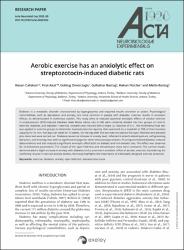| dc.contributor.author | Çalışkan, Hasan | |
| dc.contributor.author | Akat, Fırat | |
| dc.contributor.author | Ömercioğlu, Göktuğ | |
| dc.contributor.author | Baştuğ, Gülbahar | |
| dc.contributor.author | Fıçıcılar, Hakan | |
| dc.contributor.author | Baştuğ, Metin | |
| dc.date.accessioned | 2021-04-14T09:46:15Z | |
| dc.date.available | 2021-04-14T09:46:15Z | |
| dc.date.issued | 2020 | en_US |
| dc.identifier.issn | 0065-1400 | |
| dc.identifier.issn | 1689-0035 | |
| dc.identifier.uri | https://doi.org/10.21307/ane-2020-022 | |
| dc.identifier.uri | https://hdl.handle.net/20.500.12462/11460 | |
| dc.description | Çalışkan, Hasan (Balikesir Author) | en_US |
| dc.description.abstract | Diabetes is a metabolic disorder characterized by hyperglycemia and impaired insulin secretion or action. Psychological comorbidities, such as depression and anxiety, are more common in people with diabetes. Exercise results in anxiolytic effects, as demonstrated in numerous studies. This study aims to evaluate potential anxiolytic effects of aerobic exercise in streptozotocin (STZ)-induced diabetes. Male Wistar albino rats (n=40) were randomly divided into four groups of control, exercise, diabetes, and diabetes + exercise. Diabetes was induced with a single i.p. injection of STZ. The incremental load test was applied to exercise groups to determine maximal exercise capacity. Rats exercised on a treadmill at 70% of their maximal capacity for 45 min, five days per week for 12 weeks. On the day after the last exercise session the open field test and elevated plus maze test were carried out. Diabetes caused an increase in anxiety level, reflected in stretch-attend posture, self-grooming behaviors, and freezing time, with no significant changes for other behavioral parameters. Training normalized diabetes-induced deteriorations and also induced a significant anxiolytic effect both on diabetic and non-diabetic rats. This effect was observed for all behavioral parameters. The results of the open field test and elevated plus maze were consistent. The current results demonstrated a slight increase in anxiety with diabetes and a prominent anxiolytic effect of aerobic exercise. Considering the conflicting results in exercise-anxiety studies, this study highlights the importance of individually designed exercise protocols. | en_US |
| dc.description.sponsorship | Ankara University Scientific Research Projects Council 17L0230013 | en_US |
| dc.language.iso | eng | en_US |
| dc.publisher | Nencki Inst Experimental Biology | en_US |
| dc.relation.isversionof | 10.21307/ane-2020-022 | en_US |
| dc.rights | info:eu-repo/semantics/openAccess | en_US |
| dc.subject | Exercise | en_US |
| dc.subject | Diabetes | en_US |
| dc.subject | Anxiety | en_US |
| dc.subject | Open Field Test | en_US |
| dc.subject | Elevated Plus Maze | en_US |
| dc.title | Aerobic exercise has an anxiolytic effect on streptozotocin-induced diabetic rats | en_US |
| dc.type | article | en_US |
| dc.relation.journal | Acta Neurobiologiae Experimentalis | en_US |
| dc.contributor.department | Tıp Fakültesi | en_US |
| dc.identifier.volume | 80 | en_US |
| dc.identifier.issue | 3 | en_US |
| dc.identifier.startpage | 245 | en_US |
| dc.identifier.endpage | 255 | en_US |
| dc.relation.publicationcategory | Makale - Uluslararası Hakemli Dergi - Kurum Öğretim Elemanı | en_US |


















